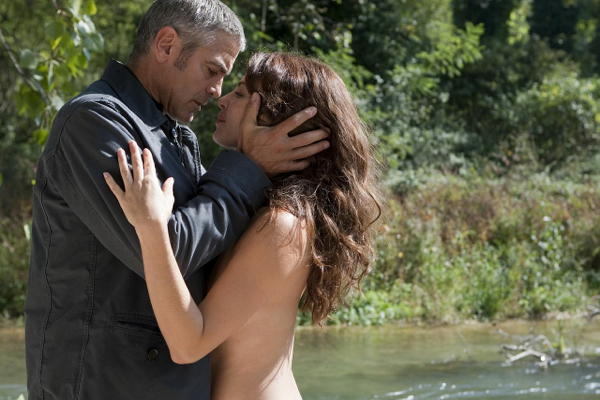Movie review by Greg Carlson
Legendary music video director and rock photographer Anton Corbijn’s second foray into feature filmmaking presents George Clooney as “The American.” Loosely based on Martin Booth’s 1990 novel “A Very Private Gentleman,” the movie delights in subverting action, espionage, and thriller genre expectations by way of a stylistic monasticism that withholds the trappings of wall-to-wall gunplay, high-speed car chases, and the otherworldly refutation of the laws of logic and physics. The film’s deliberate pacing and contemplative silences and stillness complement Corbijn’s artful sense of spatial dynamics, which are gorgeously framed by cinematographer Martin Ruhe in frequent long shot.
Clooney plays a tight-lipped gunman known to some as Jack and to others as Edward. A formidable opponent, Jack eludes death in a Swedish snowscape, but makes a regrettable decision that casts a shadow of impending doom over his relocation to Italy, where he agrees to craft a high-powered rifle for a demanding and beautiful client. Jack is resourceful and disciplined, and moves with the economy of a person who long ago grew eyes on the back of his head. Clooney is adept at comedy and drama, and knows there is little to laugh at in the contours of this stealthy killer. At one point, a clip of Henry Fonda in Sergio Leone’s “Once Upon a Time in the West” plays on a TV in a café, reminding us that sometimes, our favorite good guys need to be bad,
“The American” has drawn comparisons to the poetics of Michelangelo Antonioni and the impossible cool of Jean-Pierre Melville’s “Le Samourai,” and Corbijn goes out of his way to match the tailored, impeccable elegance of Alain Delon and the monochromatic palette of Francois de Lamothe’s ferociously spartan production design and set decoration. The movie also brings to mind Jim Jarmusch’s killer-for-hire films “The Limits of Control” and “Ghost Dog: The Way of the Samurai,” but Corbijn’s straighter portrait lacks most of Jarmusch’s irony and all of his absurdity.
Even though Corbijn strips away plenty of Hollywood fat, he never fully accounts for some wonderfully implausible embroidery, including the title character’s ongoing dialogue with a thoughtful priest, a senior thesis project’s worth of butterfly symbolism, and a whore with a heart of gold (a world-class beauty as played by Violante Placido, one marvels that she works out of a tiny Italian village). The “one last job” premise goes hand in glove with the inescapable occupational hazard often identified as the “you can never leave” clause, which makes one wonder how any master assassin of the movies could be so deluded to think that a safe and pleasant retirement awaits.
Deliberately, the viewer never learns key details that would shed light on Jack’s journey or personal history, and the mystery encourages an amount of anxiety that serves Corbijn’s detached agenda. Without knowing whether the protagonist works for a government or as a mercenary or as a willing hand to the highest bidder, we never get a grip on the man’s sympathies and allegiances. Certainly, Jack understands the consequences of his vocation, and at one point – since he knows better than to ask who will be on the receiving end of a bullet from the weapon he has built – he resigns himself to the likelihood that he will soon read about the result of his gunsmithing.
